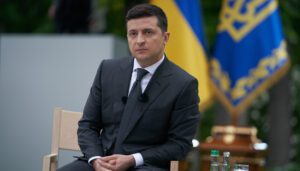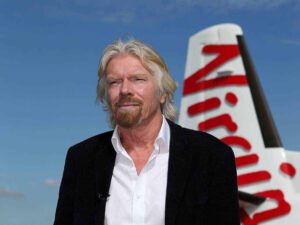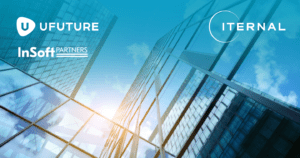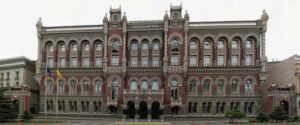
President of Ukraine Volodymyr Zelensky calls on businessmen and politicians who left the country to return to Ukraine within the next 24 hours, as this is “an important moment of the country’s unity.”
“I would focus on our management, on our country, on the people who today, some of them, are abroad, members of some parties, I don’t even want to say their names, you all understand what kind of people they are. It seems to me that this is a serious challenge. I think we should give them a signal – a fair one. First of all, from the Verkhovna Rada, from the speaker, from the state, and on my own behalf I would like to ask them to bring some of their relatives within 24 hours, to return to the country after all,” Zelensky said at a joint briefing with the German chancellor in Kyiv on Monday.
He stressed that this is an important moment, “the moment of the country’s unity.”

President of Ukraine Volodymyr Zelensky thanked businessman Richard Branson and representatives of world business for supporting the Ukrainian state.
“Grateful to Richard Branson and the global business community for supporting Ukraine. Innovative businessmen best understand the key vectors of human development. Hence, their call to unite and defend Ukraine’s sovereignty, in particular, by imposing sanctions on the aggressor, is crucial,” Zelensky said on Twitter last week.
A day earlier, Branson said that in Twitter that “for business leaders, this is the moment to come together and stand up for Ukraine’s sovereignty,” and also published a link to his article “My thoughts on Ukraine and Russia” in which he repeated this thesis. “For business leaders, this is the moment to come together and stand up for Ukraine’s sovereignty. Even if it comes at a price, all of us should send a clear message that unilateral aggression is always unacceptable and that the global business community will support the full range of sanctions against any nation that seeks to violate the sovereignty of another,” he said.
The businessman also said in the article that “Business leaders all over the world have been watching the build-up of Russian troops and equipment at the Ukrainian border with great concern” and that any war between Russia and Ukraine will have devastating and terrible consequences, primarily for the civilian population on both sides, and further isolates Russia.
“But never in recent years has there been a greater risk of an all-out war on European soil – a war that, like so many before it, does not serve a just or legitimate objective. (It is hard for any of us to hide our exasperation at this point. In 2022, what on earth is one country doing amassing tanks at another country’s borders?” Branson said.

Among 136 company executives surveyed by the European Business Association, some 45% of companies are ready to continue operating even in the event of a Russian military invasion of Ukraine, another 17% of companies consider the relocation to the western regions, some 10% think of leaving the country in the worst-case scenario, while 7% fear that external aggression may lead to the closure of their business.
“A quarter of the EBA member companies see the situation on eastern borders as a psychological attack through disinformation in the media. Meanwhile, the majority, namely 67%, believe that Ukraine and the international community should stay alert,” the EBA said in a press release on Friday following results of the survey conducted among member companies on January 24 to January 27.
However, some 40% of EBA member companies have their contingency plans, some 40% think of preparing ones, and 15% are currently without any plans. Companies note the difficulties of plan preparation as there are too many potential scenarios to be considered.
Most of the companies with “plan B” formed it with consideration of the following priorities: the first is providing safety for people (employees, their families and customers), the second is the security of assets, documents, data, financial stability, while the third is ensuring the viability of the company and business continuity.
With regard to the safety of people, companies are considering relocation, evacuation, information and support, the association said.
Common plans for the preservation of assets include the physical protection of property and equipment or its relocation to other regions, strengthening information security, withdrawal of funds, and insurance, the EBA said.
Some 58% of companies plan to retain their team, while for 14% this is not even a question, they continue to hire and develop people. Only 14% say they will resort to laying off some employees or sending them on unpaid leave, while 4% think of reducing the salaries, according to the survey data.
“We also asked companies what factors will be most important for their business in the case of an emergency. For most respondents (91%), it is a stable operation of the infrastructure which includes telecommunications, financial, ground-based logistics. Meanwhile, 62% consider it important to have constant communication and enough information from country leaders. For 60%, the most essential is to have a smooth and coordinated work of state agencies and services,” the EBA said.
The association urged the authorities to pay attention to these aspects that can heavily impact business operations at a critical moment.
“Also communicate more with companies because this is what helps to reduce misinformation and tension” the EBA said.

Ukrainian collaborates to continue cooperation and invest in larger projects
Kyiv, January 17, 2022. – Investment company InSoft Partners and holding company UFuture announce the sale of their joint outsourcing business ITernal Group to an international company headquartered in Aliso Viejo, USA, UST. Deal negotiations lasted from September 2021 to January 2022.
ITernal Group, a joint project of InSoft Partners and UFuture, was launched in 2018. Within 1.5 years, Lenal and Rademade software development businesses from Kyiv, as well as service department of Rozdoum company from Kharkiv, were acquired. Over the next six months, they were merged into a single entity, ITernal Group.
The new owner of ITernal Group, international company UST, has been working in the software development market for over 22 years. The acquisition of ITernal will allow UST to expand its Eastern European presence: the company did not have an office in Ukraine before.
As part of the business reformatting, InSoft Partners also withdrew from the educational project ucode IT academy in favor of its strategic partner UFuture. The companies have been developing ucode IT academy since 2018. During this time, they created a unique software product for students training and several joint educational programs with Ubisoft, CISCO, Ajax Systems, Squad and others.
UFuture will continue to develop ucode IT academy as an educational platform within its own social investment projects to develop Ukraine’s innovation potential. Now ucode IT academy works at UNIT.City innovation park in Kyiv.
“With ITernal Group creation we tested the idea of several small IT companies merging for reducing money spending and sustainable scaling of business. We deliberately went into small businesses and merged them not consistently, but simultaneously to test our business skills within small companies. Merging small companies into a large entity and its strengthening due to the reputation of majority shareholders has helped the ITernal Group to start cooperation with high-level clients. Successful completion of the business cycle (development of an idea – several companies buying – merging them into one entity – selling to a large strategist) confirmed our idea. Together with UFuture, we plan to use this model in larger projects,” said InSoft Partners founder Vitaly Gorovoy.
“Our partnership with InSoft Partners is just beginning. The sale of ITernal Group was, firstly, highly profitable, secondly, showed us scale prospects. I am glad that we have attracted a great international company UST to Ukraine. This is not only an international investment in the development of the project, but also new experience, knowledge and opportunities for talented Ukrainian teams,” said Vasyl Khmelnytsky, founder of the UFuture holding company.
Additional information
UFuture is a holding company of Ukrainian entrepreneur Vasyl Khmelnytsky that integrates his business and impact-investment projects.
The company has a diversified portfolio of assets in the fields of real estate, infrastructure, industry, renewable energy, pharmaceuticals, and IT. Currently, UFuture’s assets are estimated at $500 million, and the total capitalization of the businesses it invested in is up to $1 billion.
InSoft Partners is an investment company that buys stakes in IT service companies and helps them grow. Specialization: IT business value increasing, scaling, M&A. Core Value, Cloudfresh are among of their completed projects.
UST, for more than 22 years, has worked side by side with the world’s best companies to make a real impact through transformation. Powered by technology, inspired by people, and led by our purpose, we partner with our clients from design to operation. Through our nimble approach, we identify their core challenges, and craft disruptive solutions that bring their vision to life. With deep domain expertise and a future-proof philosophy, we embed innovation and agility into our clients’ organizations – delivering measurable value and lasting change across industries, and around the world. Together, with over 28,000 employees in 28 countries, we build for boundless impact – touching billions of lives in the process.

The Business Activity Outlook Index (BAOI), calculated by the National Bank of Ukraine (NBU), fell to 48.6 in December from 49.8 in November, and continued to fall below the neutral level, as evidenced by the results of a survey of enterprises released on Tuesday conducted by the central bank.
“For the second month in a row, business expectations for their economic results were below neutral levels amid continuing quarantine restrictions. Surging energy prices, shortages of raw materials, higher production costs, a greater probability of an escalation of the armed conflict and an increase in COVID-19 cases worldwide weakened expectations in all of the surveyed sectors,” the National Bank said, commenting on the results of the December poll.
According to the study, services companies have been expecting weaker performance for two months running, the DI being 47.8 in December, down from 48.8 in November. Respondents expected a decrease in the number of new orders, while also expecting no change in the amount of services provided. At the same time, they expected an increase in the amount of services that are being provided.
The expectations of trading companies also worsened, moving below their neutral level, as the sector’s DI dropped to 49.6 in December, down from 50.0 in November. Respondents expected an increase in the stocks of goods for sale, while also expecting the amount of goods purchased for sale to be unchanged on the previous month. Trading companies said they intended to decrease their trade margins further. With a seasonal rise in demand, respondents remained upbeat about their trade turnover.
Construction companies reported the most pessimistic expectations of their performance, as the sector’s index dropped to 47.2 in December, down from 50.4 in November, dragged down by a seasonal decline in economic activity and narrowing investment demand. Respondents expected a drop in the number of new orders and, consequently, a drop in their purchases of raw materials and supplies.
Industrial companies were pessimistic about their performance and economic outlook for the first time in the last seven months, as the sector’s DI dropped to 49.0, down from 50.7 in November. Respondents expected a decrease in the number of new export orders.
According to the NBU, employment expectations worsened: only trading companies said they intended to hire more staff, while industrial, construction and services companies reported intentions to cut their workforces.
The monthly survey was conducted from December 6 to December 23, 2021. A total of 405 companies were polled. Of the companies polled, 44.7% are industrial companies, 28.6% services companies, 20.7% trading companies, and 5.9% construction companies; 33.3% of the respondents are large companies, 28.9% medium companies, and 37.8% small companies.

In January-October 2021, Ukrainian banks issued 8,700 mortgage loans in the amount of UAH 7 billion, which is twice as high as the figure over ten months of 2020 in the number of such loans and 2.5 times more in the volume, the National Bank of Ukraine (NBU) said on Wednesday following a monthly survey of banks. According to it, lending in October decreased by 4.7% over the month in terms of the volume of mortgage loans (UAH 774 million) and increased by 2% in terms of the number – to 963 agreements.
The press service noted that the mortgage lending market remains concentrated: the five most active banks have concluded 90% of new deals.
Loans for the purchase of housing in the secondary real estate market are still overtaking the primary market: in October, their share exceeded 90% of all mortgage loans issued, both in terms of the number of contracts and in terms of the money volume, the press release says.
According to the survey, the average amount of a mortgage loan in October was lower than in September – UAH 803,900 versus UAH 858,100.
According to the NBU, in October the average effective rate of a mortgage loan in the secondary market decreased by 0.4 percentage points, to 13.5%, and in the primary market – by 2 percentage points, to 14.9%.